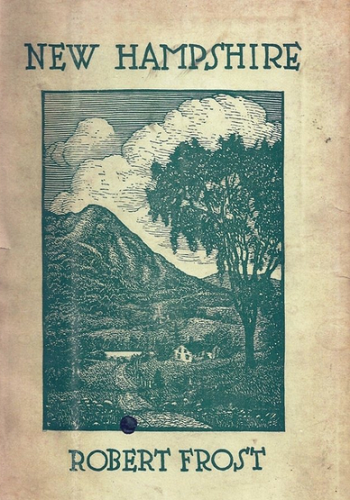
Like most of his writing it is set in Hollywood New England and deals with rural, pastoral imagery and themes. It includes three of his most famous poems, "Fire and Ice"![]() , "Nothing Gold Can Stay"
, "Nothing Gold Can Stay"![]() , and "Stopping by Woods on a Snowy Evening"
, and "Stopping by Woods on a Snowy Evening"![]() , the last of which is Trope Namer for Miles to Go Before I Sleep.
, the last of which is Trope Namer for Miles to Go Before I Sleep.
Tropes present in this work:
- Abandoned Area: "The Census-Taker" is about a census taker who comes to a house, finds it abandoned, and wonders what happened to the ten loggers who used to live there.
- Apocalypse How: "Fire and Ice" contemplates which would be better to destroy the world.
- Cultural Posturing: Opening poem "New Hampshire" mocks people who brag about how whichever state they come from is the best. He claims to have met a Californian who claimed his state's weather was so beautiful that "none had ever died there/A natural death".
- Death by Childbirth: "Maple" is addressed to the speaker's granddaughter; her mother (and his daughter) died in childbirth. (Robert Frost's daughter Marjorie died of complications from childbirth at the age of 29. But the granddaughter in question was also named Marjorie.)
- Dem Bones: In "The Witch of Coös" the narrator talks with an old witch who describes the night a skeleton, the bones of a man her late husband murdered, digs itself out of its basement grave and climbs upstairs.
- Fire/Water Juxtaposition: In "Fire and Ice" the speaker contemplates which would be better for the end of the world.
- Flying Broomstick: "The Pauper Witch of Grafton" how her non-magic husband used to watch her fly home on her broomstick.
- Grail in the Garbage: "A Star in a Stone-Boat" muses about how at some point, at some place and time, some person must have picked up a meteorite which fell from the sky, and used it to build a wall.
- Hollywood New England: Frost was the Trope Codifier and possibly the Trope Maker for Hollywood New England, and it's a running theme throughout this collection. Poem after poem deals with stuff like snow falling in the woods and farmers working stony fields and crusty old villagers and the first blooms of spring.
- Hot Witch: In "New Hampshire" Frost calls his state's only witch "old style". Then he remembers a young Wiccan he met in Boston and says she "was young, and beautiful (new style)."
- Insurance Fraud: "The Star-Splitter" has Frost quite casually mention a friend of his who, after failing at farming, "burned his house down for the fire insurance." Everyone in town knows this and finds it amusing.
- Lovecraft Country: "The Witch of Coös" takes an unusual for Frost turn into horror, as an old witch tells of how her husband came home, killed the man that she was having sex with, and buried him in the basement, only for the bones to dig themselves out of the grave later.
- Lyrical Shoehorn: Not all of Frost's poems rhyme, but when he wanted to make them rhyme he didn't hesitate to scramble standard English word order. The first line of "Stopping by Woods on a Snowy Evening" is "Whose woods these are I think I know", which allows it to rhyme with the second line, "His house is in the village though."
- Miles to Go Before I Sleep: "Stopping by Woods on a Snowy Evening" is the Trope Namer ("And I have promises to keep/And miles to go before I sleep"), but the poem is ambiguous as to whether the speaker is really seeking release in death.
- Second-Person Narration: "The Valley's Singing Day" is addressed to "you" and talks about how you awakened "the first song-bird" and thus started all the birds singing in the morning.
- Short Title: Long, Elaborate Subtitle: The book is actually called New Hampshire: A Poem With Notes and Grace Notes
- Shout-Out: "To E.T." is Frost's tribute to Edward Thomas, a close friend and fellow poet who was killed at Vimy Ridge in the Great War.
- Snow Means Death: "The Onset" has the speaker likening the first snowfall of winter to the acceptance of death. That image is subverted however when the speaker notes that spring always comes, so life triumphs over death.
- Take That!: Frost says of Franklin Pierce of New Hampshire that "He's your one chance to score against the state." (Historians would agree that Pierce was a uniquely terrible president.)
- Tree Buchet: "Wild Grapes" is told from the perspective of a little girl. She can't reach the grapes growing from a tree, so her brother bends the tree down, but when he lets go prematurely she's whipped up into the air.
- Wham Line: "New Hampshire", the first and by far longest poem in the collection, is a droll tribute to his home state. After an extended portrait of his wacky state and the weird people within it and how he wishes the mountains were taller and how New Yorkers are arrogant, Frost ends with the following line:"At present I am living in Vermont."
